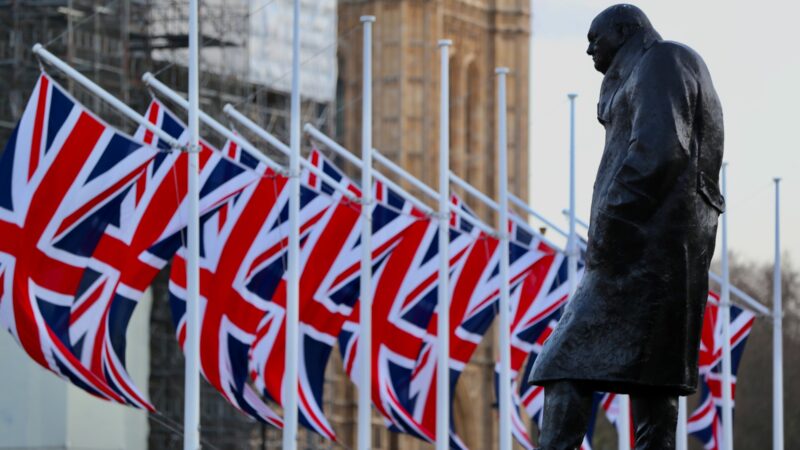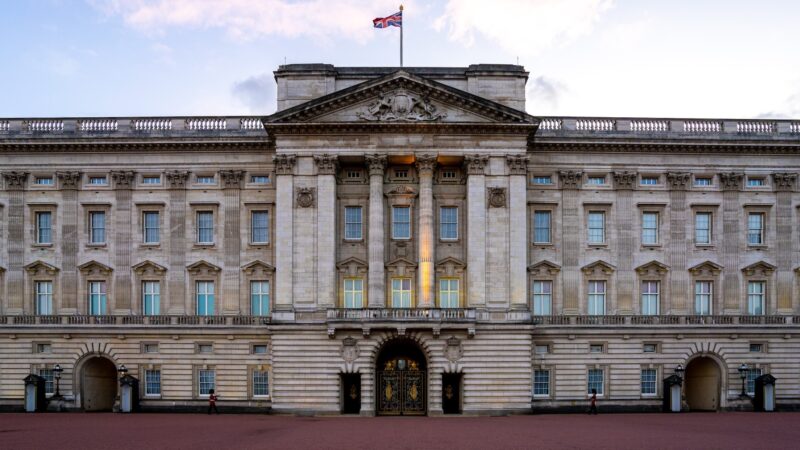An Opportunity from Nothing – View from the National Conservatism Conference
Strolling down Marsham street, past the Itsu and Pret a Manger, a funny looking man in a top hat flanked by grey haired beret wearing old women scream at the top of their lungs whilst recording a group of depressed looking individuals clad in ill-fitting suits who walk past them and into the Emmanuel Centre. Loud renditions of ‘Ode to Joy’ blare from the portable speakers powered from a generator in a white van plastered in EU flags.
You might think, for at least a moment, that I am describing a snapshot from 2017. That these individuals are making plans for Britain’s ‘strategy moving forward as we leave the EU’, and that Mister Bray would at least have a reason to be shouting ‘bollocks to Brexit’ at the passers-by. Instead, the year is 2023, Brexit is barely being mentioned at all inside the walls of the conference room, and no one is quite sure what he – or they – are there for.
That seems to be an outstanding theme of the conference: uncertainty. No one at all seemed to be able to pin down exactly what it was that they stood for. A plethora of rambling speeches about Edmund Burke, multiple references to ‘Le contrat sociale’, continuous struggle sessions against the rotting corpse of Margret Thatcher (who seemingly still operates behind the shadows in every corner of government), and yet nothing new or interesting was being said, just vague topics which they knew everyone would sort of agree with anyway.
Worse still, a lot of the high-profile attendees (especially the MP’s who bothered to turn up) didn’t really seem to know what the event was for. A favourite moment of mine was when, at the very opening of the event, Yoram Hazony and Jacob Rees-Mogg accidentally went ‘head-to-head’ in debating the finer points of the corn laws and the benefits of wheat tariffs in their separate speeches… absolutely thrilling stuff which really tackled… THE ISSUES.
Another devastating moment was when Suella Braverman took the stage to talk about her vision for Britain. In actuality, it was a 25-minute party political broadcast about why you should just ignore the last decade of Tory government and still trust her to ‘stop the boats’. It’s always so upsetting when you listen to actual real politicians – high ranking ministers, no less – who act like opinion piece columnists. The looks on the faces of the attendees during her talk said it all: “YOU ARE A MINISTER OF STATE, YOU HAVE CONTROL OVER THE HOME OFFICE, DO SOMETHING!”
No leadership, no courage, no unified vision. This is what the supposedly ‘Real Right Wing’ looks like for Britain at the moment. No figure appeared to give any sense of direction or policy; they would much rather ‘hash out the arguments’ and ‘make their case’ instead. This is not how you win elections or drive the mechanisms of state, this is how you gain followers on twitter or get a graduate columnist job at [MAGAZINE_NAME.COM].
Despite my negativity, I actually think that this presents a wonderful opportunity for those with more dissenting ideas on what the future of ‘national conservatism’ means in Great Britain. “NatCon” doesn’t really know what it seeks to be and has no defined leadership, so why not show it the way? Instead of feeling like a ‘captured institution’, it felt like a proto-organisation which can’t quite put its finger on what it is yet. Instead of allowing it to lean on the boring and decaying figures of the present, a fascinating vacuum is opening up to swallow anyone with the boldness to make clear cut statements on what they wish to see as the future of National Conservatism. Doing *that* would be a lot easier than any sort of ‘Tory Entryism’ which the generation before us sought to complete.
At the very least, the conference was an excellent opportunity for networking. It was nice to see a format more similar to CPAC than Tory Party Conference, with many MPs, intellectuals, and journalists more than happy to sit and chat with you outside of the main hall instead of listening to the lectures. This was genuinely enjoyable and made the experience a lot more worthwhile. I sincerely hope that more events like that can take place in future.
Enjoying The Mallard? Consider subscribing to our monthly magazine.











British Conservatism is Ignorant of History and has Forgotten its Past (Magazine Excerpt)
This dictatorship of the present has been enabled by around thirty years of material abundance and relative peace following the conclusion to the Cold War. As John Keegan, the military historian put it, Britain and American can afford our universalist idealism and our fantasies of a benevolent world united and ameliorated through commerce, given our good geographical fortune of being separated from continents by bodies of water. We can forget that the tides of history have pulled whole cultures under in violence and war, instead indulging in an imagined progressive history, moving ever upwards towards ever greater enlightenment and prosperity.
Our leaders, if they deserve the name, have forgotten the lessons of history, because they do not know history. They do not know the fate of nations and peoples. They are ignorant of the importance of the landscape of the world and the moral landscape of the heart, and how the interplay between the two shapes the destinies of civilisation. It is not to engage in nostalgia for a vanished age that never existed to reckon with the fact that those who governed us in the past were well aware of life’s tragic nature, of the reality of necessity and the ultimate goal of the avoidance of anarchy, its own form of tyranny. Our leaders in the 19th and up to the mid-20th centuries had been baptised in the fires of historical experience and therefore knew that the maintenance of right order, in accordance with the good, true, and beautiful, was the precondition for any liberty. Utopian, romantic ideas of universal rights, spreading democracy and natural freedom were dangerous in their unbounded idealism, leading nations and government astray in the quest for moral perfection.
History never ended, in the sense Francis Fukuyama meant it. Hegel, and his disciple Alexander Kojeve, were both wrong in discerning a direction to human History that would see the creation of the perfect liberal democratic regime and state of being in our world. History is the story of the deeds men and women do and accomplishments achieved together as clans, tribes, cities, empires, and nations. It is a story that will only end at the end of all things. Awareness of the living past reminds us that our lives are part of the weave of time, stretching back across the years, our own lives and the actions we take adding the threads that continue into the future.
This is an excerpt from “Mayday! Mayday!”. To continue reading, visit The Mallard’s Shopify.
Photo Credit